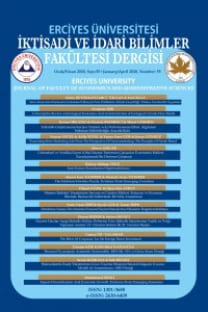KNOWLEDGE AND PERCEPTION OF TURKEY IN A COLLEGE IN THE UNITED STATES
Perception of Turkey; Knowledge on Turkey; Turkey’s Image in the United States; Attitudes towards Turkey.
KNOWLEDGE AND PERCEPTION OF TURKEY IN A COLLEGE IN THE UNITED STATES
___
- ALTINBAŞAK, İpek; (2008), “Understanding the prejudices in order to improve the image of Turkey: A qualitative study on the prejudices of Italians about Turkey”, Boğaziçi Journal: Review of Social, Economic and Administrative Studies, 22(1-2), pp. 35-51.
- BALOĞLU, Şeyhmus; (2001), “Image variations of Turkey by familiarity index: informational and experiential dimensions”,Tourism Management, 22(2), pp. 127-133.
- BURNS, Nicholas R; (2007, September 13), “The Future of the U.S.-Turkey Relationship, Remarks at the Atlantic Council of the United States (ACUS)”, U.S. Department of State, Internet Address: http://www.state.gov/p/us/rm/2007/92066.htm, Date of Access: June 18, 2008
- BURNS, Nicholas; (2005, July 18), “The U.S.-Turkish Relationship beyond Iraq: Common Values, Common Agenda (full transcript)”, Washington Institute, Internet Address: http://www.washingtoninstitute.org/templateC07.php?CID=24, Date of Access: August 3, 2008.
- ÇAĞRI, Erhan; (2000), “The American Perception of the Turks: An Historical Record”, The Turkish Yearbook, 31(2), pp. 75-97.
- ÇAKMAK, Cenap; (2008, February 17), “Türkiye'ninABD’dekiİmajıSorunu“, BILGESAM, Internet Address: http://www.bilgesam.com/tr/ index.php?option=com_ content&view=article&id=77:tuerkiyenin- abddeki-maj-sorunu&catid=98:analizler-abd&Itemid=135, Date of Access: April 29, 2010.
- CNN; (2006, May 4), “Study: Geography Greek to young Americans”, Internet Address: http://edition.cnn.com/2006/EDUCATION/05/02/geog.test/, Date of Access: October 22, 2010.
- GAMAREKIAN, Barbara; (1987, January 20), “Washington Talk: Embassy Row; Turkey Focuses on Its Image”, The New York Times, Internet Address: http://www.nytimes.com/1987/01/20/us/washington-talk- embassy-row-turkey-focuses-on-its-image.html?pagewanted=1, Date of Access: May 2, 2010.
- GRIES, Peter Hays and H. Michael CROWSON; (2010), “Political Orientation, Party Affiliation, and American Attitudes Towards China”, Journal of Chinese Political Science, 15(3), pp. 219-244.
- HOGE, Warren; (2005, June 11), “Turkish Leader Spells out More Vigorous Role in Iraq”, The New York Times, Internet Address: http://query.nytimes.com/gst/fullpage.html?res=9A06E6D71138F93 2A25755C0A9639C8B63&scp=4&sq= 2005%20Turkey%20allows %20 supplies%20to%20US%20military%20Iraq&st=cse, Date of Access: May 24, 2010.
- KAĞITÇIBAŞI, Çiğdem; (1973), Gençlerin Tutumları: Kültürler Arası bir Karşılaştırma, Ankara: ODTÜ Fen-Ed. Fak. Yayınları, No. 25.
- KARLINS, Marvin, Thomas L. COFFMAN and Gary WALTERS; (1969), “On the Fading of Social Stereotypes: Studies in three generations of college students”, Journal of Personality and Social Psychology, 13, pp. 1-16.
- MOORE, David M.; (2002, March 5), “Americans More Unfavorable Than Favorable Toward Muslim Countries.” Gallup News Service, Internet Address:http://www.gallup.com/poll/5428/americans-more- unfavorable-than-favorable-toward-muslim-countries.aspx,Date of Access: April 29, 2010.
- ÖZTÜRK, İbrahim; (2009, December 10), “Model OrtaklığınEkonomisi”, Zaman.
- PETHOKOUKIS, James; (2005, December 2), “Small Biz Watch: Studies show effectiveness of word of mouth”, U.S. News & World Report, Internet Address: http://www.usnews.com/usnews/biztech/ articles/051202/ 2sbw.html, Date of Access: February 20, 2011.
- PRESTON, Mark; (2009, April 7), “Poll: U.S. Split on Muslim Allies”, CNN Online, Internet Address: http://www.cnn.com/2009/POLITICS /04/06/us.muslim.poll/, Date of Access: May 11, 2010.
- WEISMAN, Steven R.; (2003, April 3), “A Nation at War: Diplomacy; Powell Patches Things Up, As Turkey Consents to Help”, The New York Times, Internet Address: http://www.nytimes.com/2003/04/03/ world/a-nation-at-war-diplomacy-powell-patches-things-up-as- turkey-consents-tohelp.html?scp=4&sq=turkey% 20supply%20U.S.%20american%20military%20war%20iraq&st=cs e, Date of Access: May 24, 2010.
- ISSN: 1301-3688
- Yayın Aralığı: 3
- Başlangıç: 1981
- Yayıncı: -
BİR TÜKETİCİ GRUBU OLARAK KADINLARIN MAĞAZA MARKALI ÜRÜNLERE KARŞI TUTUMLARI: GİRESUN İLİ ÖRNEĞİ
Banu ÖZBUCAK ALBAR, Teoman DUMAN
STRATEJİK YÖNETİMDE DIŞ ÇEVRE ANALİZİ: KOBİ’LER VE BÜYÜK İŞLETMELER ARASINDA BİR KARŞILAŞTIRMA
İŞÇİ GELİRLERİ VE EKONOMİK BÜYÜME İLİŞKİSİ: DİNAMİK PANEL VERİ ANALİZİ
KÜLTÜREL SİNERJİ YÖNETİMİ: KAVRAMSAL ÇERÇEVE
Mahmut ÖZDEVECİOĞLU, Fatma İNCE BALCI
KNOWLEDGE AND PERCEPTION OF TURKEY IN A COLLEGE IN THE UNITED STATES
Abdullah YUVACI, William BOWLES
Serkan BAYRAKTAROĞLU, Selda KAYABAŞI, Sevdiye ERSOY YILMAZ
TÜRKİYE’DE FISHER ETKİSİNİN GEÇERLİLİĞİ: DOĞRUSAL OLMAYAN EŞBÜTÜNLEŞME YAKLAŞIMI
